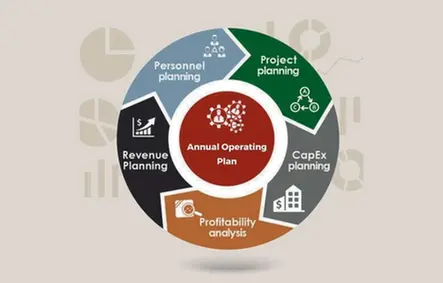Creating an Annual Operating Plan (AOP) at the start of the financial year is crucial for any business because it provides a roadmap for achieving the company's goals and objectives over the next 12 months.
Here are some of the key reasons why an Annual Operating Plan is significant :
1. Sets Direction & Priorities: An annual operating plan establishes the company's direction and priorities for the year. This helps the company stay focused on its goals and objectives, and ensures that all team members are aligned and working towards the same objectives.
2. Provides a Financial Plan: The financial plan component of the annual operating plan outlines the expected revenue, expenses, and cash flow for the year. This helps the company manage its resources effectively, make informed decisions about investments and spending, and ensure that it has sufficient capital to fund its operations.
3. Enables Resource Allocation: The annual operating plan helps the company allocate its resources, including personnel, equipment, and capital, to the areas where they will be most effective in achieving the company's goals. This ensures that resources are being used efficiently and effectively.
4. Facilitates Communication & Coordination: The annual operating plan provides a shared understanding of the company's goals and priorities, which facilitates communication and coordination among team members and stakeholders. This helps ensure that everyone is working together towards the same objectives.
5. Enables Risk Management: The annual operating plan allows the company to identify potential risks and develop strategies for mitigating them. This helps the company avoid or minimize negative impacts and take advantage of opportunities that may arise.


Creating an annual operating plan for a Real Estate Business involves several key steps :
1. Define Your Goals & Objectives: The first step in creating an annual operating plan is to define your goals and objectives. This could include targets for Revenue, Profit, Number of units to be sold or leased, Market Share, or other key performance indicators like number of unit or Sq Ft area to be delivered etc.
2. Analyse The Market: Conduct a comprehensive analysis of the real estate market in the areas where you operate. This should include an assessment of supply and demand trends, price trends, competition, and demographic and economic factors that may impact your business.
3. Develop a Marketing Strategy: Based on your market analysis, develop a comprehensive marketing strategy that will help you reach your target audience, differentiate your product offerings from those of your competitors, generate sales, delivery timelines of various projects.
4. Create a Financial Plan: Based on your goals and marketing strategy, create a financial plan that includes revenue projections, operating expenses, capital expenditures, and cash flow projections. It's important to have a realistic and achievable financial plan that accounts for any potential risks or uncertainties in the market.
5. Establish Operational Priorities: Once you have your financial plan in place, establish operational priorities that will help you achieve your goals. This could include identifying key projects to focus on, prioritizing marketing and sales efforts, and setting targets for key performance indicators.
6. Monitor & Adjust: Finally, monitor your progress throughout the year and adjust your plan as needed based on changes in the market or other factors that impact your business. Monitoring cycle should be weekly, monthly and quarterly for various performance indicators.

Overall, creating an Annual Operating Plan requires a thorough understanding of the market, a clear definition of your goals, and a detailed financial plan that takes into account your operational priorities and potential risks. With a well-designed plan in place, you can stay focused on your objectives and make informed decisions that will help you achieve success in the real estate market.
Wishing you a happy and successful FY 2023-24
Prepared by SAAR Realtech

Recent Blogs
1. Why is Real Estate Research Important
2. Maximizing Real Estate Sales
3. A Case Study On Grand Icon
4. Case Study of SAAR Realtech at IIM, Indore
5. Annual Operating Plan
6. Strategic Partnership
7. Sales & Marketing
8. Digital Marketing
Creating an Annual Operating Plan (AOP) at the start of the financial year is crucial for any business because it provides a roadmap for achieving the company's goals and objectives over the next 12 months.
Here are some of the key reasons why an Annual Operating Plan is significant :
1. Sets Direction & Priorities: An annual operating plan establishes the company's direction and priorities for the year. This helps the company stay focused on its goals and objectives, and ensures that all team members are aligned and working towards the same objectives.
2. Provides a Financial Plan: The financial plan component of the annual operating plan outlines the expected revenue, expenses, and cash flow for the year. This helps the company manage its resources effectively, make informed decisions about investments and spending, and ensure that it has sufficient capital to fund its operations.
3. Enables Resource Allocation: The annual operating plan helps the company allocate its resources, including personnel, equipment, and capital, to the areas where they will be most effective in achieving the company's goals. This ensures that resources are being used efficiently and effectively.
4. Facilitates Communication & Coordination: The annual operating plan provides a shared understanding of the company's goals and priorities, which facilitates communication and coordination among team members and stakeholders. This helps ensure that everyone is working together towards the same objectives.
5. Enables Risk Management: The annual operating plan allows the company to identify potential risks and develop strategies for mitigating them. This helps the company avoid or minimize negative impacts and take advantage of opportunities that may arise.


Creating an annual operating plan for a Real Estate Business involves several key steps :
1. Define Your Goals & Objectives: The first step in creating an annual operating plan is to define your goals and objectives. This could include targets for Revenue, Profit, Number of units to be sold or leased, Market Share, or other key performance indicators like number of unit or Sq Ft area to be delivered etc.
2. Analyse The Market: Conduct a comprehensive analysis of the real estate market in the areas where you operate. This should include an assessment of supply and demand trends, price trends, competition, and demographic and economic factors that may impact your business.
3. Develop a Marketing Strategy: Based on your market analysis, develop a comprehensive marketing strategy that will help you reach your target audience, differentiate your product offerings from those of your competitors, generate sales, delivery timelines of various projects.
4. Create a Financial Plan: Based on your goals and marketing strategy, create a financial plan that includes revenue projections, operating expenses, capital expenditures, and cash flow projections. It's important to have a realistic and achievable financial plan that accounts for any potential risks or uncertainties in the market.
5. Establish Operational Priorities: Once you have your financial plan in place, establish operational priorities that will help you achieve your goals. This could include identifying key projects to focus on, prioritizing marketing and sales efforts, and setting targets for key performance indicators.
6. Monitor & Adjust: Finally, monitor your progress throughout the year and adjust your plan as needed based on changes in the market or other factors that impact your business. Monitoring cycle should be weekly, monthly and quarterly for various performance indicators.

Overall, creating an Annual Operating Plan requires a thorough understanding of the market, a clear definition of your goals, and a detailed financial plan that takes into account your operational priorities and potential risks. With a well-designed plan in place, you can stay focused on your objectives and make informed decisions that will help you achieve success in the real estate market.
Wishing you a happy and successful FY 2023-24
Prepared by SAAR Realtech

Recent Blogs
1. Why is Real Estate Research Important
2. Maximizing Real Estate Sales
3. A Case Study On Grand Icon
4. Case Study of SAAR Realtech at IIM, Indore
5. Annual Operating Plan
6. Strategic Partnership
7. Sales & Marketing
8. Digital Marketing
Quick Links
Popular Links
Get In Touch
904-Durain, Nyati Environ,
Lane No 5, Tingare Nagar,
Vishrantwadi, Pune
© 2023 All Rights Reserved. Designed by Outdo Digital Technologies





